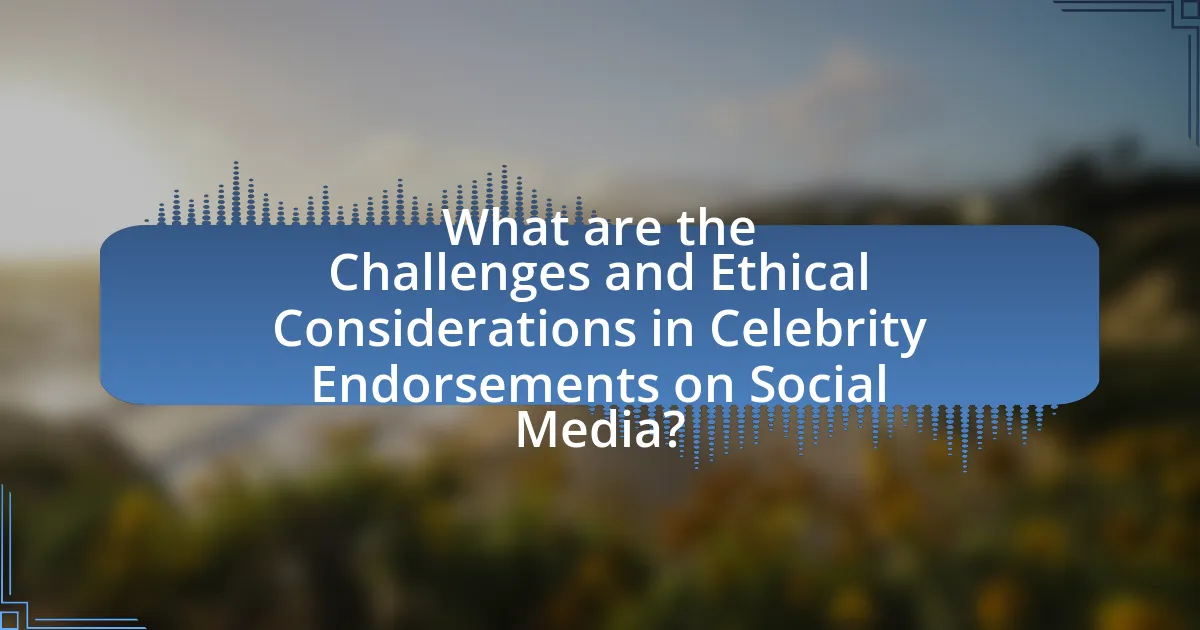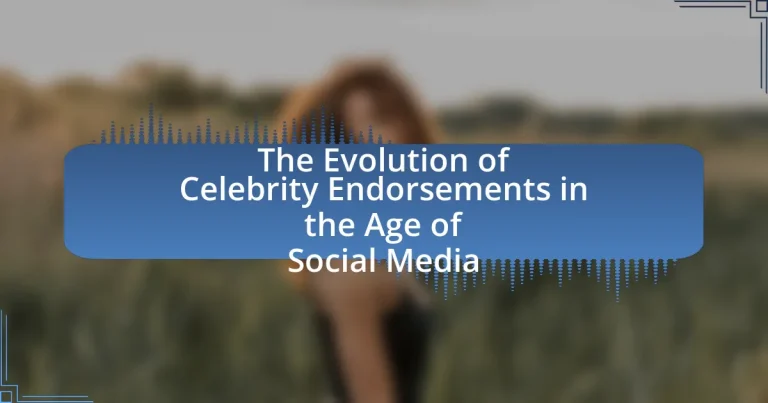Celebrity endorsements are marketing strategies where public figures promote products or services to influence consumer behavior, a practice that dates back to the late 19th century. The article explores the historical context of celebrity endorsements, their evolution from traditional media to social media platforms, and the psychological factors that enhance their effectiveness. It also examines the significance of authenticity and transparency in modern endorsements, the challenges brands face, and the legal implications of celebrity promotions on social media. Additionally, the article discusses strategies for selecting the right influencers and measuring the effectiveness of endorsements in the digital age.

What are Celebrity Endorsements and Their Historical Context?
Celebrity endorsements are marketing strategies where public figures promote products or services to influence consumer behavior. Historically, this practice dates back to the late 19th century, with early examples including the use of athletes and entertainers in advertising campaigns. For instance, in 1900, the famous singer and actress Lillian Russell endorsed a brand of soap, marking one of the first instances of a celebrity being used to enhance product appeal. Over the decades, the effectiveness of celebrity endorsements has been supported by research indicating that consumers often associate the qualities of the celebrity with the endorsed product, thereby increasing brand recognition and sales. This trend has evolved significantly with the rise of social media, where celebrities can engage directly with audiences, further amplifying their influence on consumer choices.
How have celebrity endorsements evolved over time?
Celebrity endorsements have evolved from traditional advertising methods to a more integrated and interactive approach due to the rise of social media. Initially, endorsements primarily involved celebrities promoting products through television commercials and print ads, where the focus was on the celebrity’s image and reputation. With the advent of social media platforms, endorsements have shifted towards authentic engagement, where celebrities interact directly with their followers, often sharing personal experiences with products. This change has been driven by the increasing demand for transparency and relatability from consumers, as evidenced by a 2021 survey indicating that 61% of consumers trust influencer recommendations more than traditional advertisements. Consequently, brands now prioritize partnerships with influencers who resonate with their target audience, leading to a more dynamic and personalized marketing landscape.
What were the early forms of celebrity endorsements?
Early forms of celebrity endorsements included the use of famous personalities in advertising campaigns to promote products, which began in the late 19th century. For instance, in the 1900s, brands like Pears Soap utilized well-known figures, such as actors and athletes, to enhance their product appeal and credibility. This practice capitalized on the public’s admiration for these individuals, leveraging their fame to influence consumer behavior and establish brand loyalty. Historical examples include the endorsement of Coca-Cola by popular athletes and the use of actors in print advertisements, which set the foundation for modern celebrity endorsements.
How did traditional media influence celebrity endorsements?
Traditional media significantly influenced celebrity endorsements by providing a platform for celebrities to reach mass audiences through television, radio, and print. This exposure allowed brands to leverage the popularity and credibility of celebrities, leading to increased consumer trust and purchase intent. For instance, a study by the American Marketing Association found that 70% of consumers are more likely to trust a brand when endorsed by a celebrity they admire, highlighting the effectiveness of traditional media in shaping public perception. Additionally, traditional media’s ability to create memorable advertisements featuring celebrities contributed to brand recognition and loyalty, further solidifying the role of celebrity endorsements in marketing strategies.
Why are celebrity endorsements significant in marketing?
Celebrity endorsements are significant in marketing because they leverage the influence and credibility of well-known figures to enhance brand visibility and consumer trust. Research indicates that 49% of consumers say they depend on recommendations from influencers when making purchasing decisions, demonstrating the power of celebrity associations in shaping consumer behavior. Additionally, brands that utilize celebrity endorsements often experience increased sales and improved brand recognition, as seen in campaigns where celebrities have effectively connected with target audiences, leading to a measurable boost in engagement and conversion rates.
What psychological factors make celebrity endorsements effective?
Celebrity endorsements are effective due to several psychological factors, including trust, identification, and social proof. Trust is established as consumers often perceive celebrities as credible sources, leading to increased likelihood of product acceptance. Identification occurs when consumers relate to a celebrity’s lifestyle or values, enhancing their emotional connection to the endorsed product. Social proof is evident as individuals tend to follow the behaviors of admired figures, believing that if a celebrity uses a product, it must be valuable. Research by Ohanian (1990) supports these claims, indicating that perceived expertise and trustworthiness of a celebrity significantly influence consumer attitudes and purchase intentions.
How do celebrity endorsements impact brand perception?
Celebrity endorsements significantly enhance brand perception by leveraging the trust and admiration consumers have for the celebrity. Research indicates that 49% of consumers are more likely to purchase a product endorsed by a celebrity they admire, as these endorsements create a positive association between the celebrity and the brand. This association can lead to increased brand awareness, credibility, and consumer loyalty. For instance, a study published in the Journal of Advertising Research found that brands endorsed by celebrities experienced a 20% increase in consumer purchase intent compared to those without endorsements. Thus, the impact of celebrity endorsements on brand perception is both measurable and substantial.

How has Social Media Transformed Celebrity Endorsements?
Social media has transformed celebrity endorsements by enabling direct interaction between celebrities and their audiences, enhancing authenticity and engagement. This shift allows celebrities to promote products in a more personal and relatable manner, often through platforms like Instagram and TikTok, where they can share real-time experiences and opinions. According to a 2021 survey by Influencer Marketing Hub, 63% of consumers trust influencers more than traditional celebrities, indicating a significant change in consumer perception and trust. Additionally, social media has democratized endorsements, allowing micro-influencers with smaller but highly engaged followings to effectively promote brands, thus broadening the scope and impact of celebrity endorsements.
What role does social media play in modern celebrity endorsements?
Social media serves as a crucial platform for modern celebrity endorsements by enabling direct interaction between celebrities and their audiences. This interaction fosters authenticity and relatability, which enhances consumer trust in endorsed products. According to a 2021 study by the Journal of Advertising Research, 70% of consumers are more likely to purchase a product when endorsed by a celebrity they follow on social media. Additionally, social media allows for real-time engagement and feedback, amplifying the reach and impact of endorsements through shares and likes, which can lead to viral marketing effects.
How do platforms like Instagram and TikTok facilitate endorsements?
Platforms like Instagram and TikTok facilitate endorsements by providing influencers and brands with tools for direct engagement and content sharing. These platforms enable users to create visually appealing content that showcases products in authentic settings, which enhances relatability and trust among followers. For instance, Instagram’s features like Stories, Reels, and shopping tags allow influencers to seamlessly integrate products into their daily lives, while TikTok’s short-form video format encourages creative and entertaining product demonstrations. According to a 2021 survey by Influencer Marketing Hub, 90% of marketers reported that influencer marketing on these platforms is effective, highlighting their role in driving consumer purchasing decisions.
What are the differences between traditional and social media endorsements?
Traditional media endorsements typically involve celebrities promoting products through established channels such as television, radio, and print, while social media endorsements leverage platforms like Instagram, Twitter, and TikTok for direct engagement with audiences. Traditional endorsements often rely on scripted advertisements and broader reach, whereas social media endorsements allow for more authentic, spontaneous interactions and targeted marketing to specific demographics. For instance, a study by the American Marketing Association found that social media endorsements can lead to higher engagement rates, with influencers achieving up to 10 times more engagement than traditional celebrity endorsements.
Why do brands choose social media influencers over traditional celebrities?
Brands choose social media influencers over traditional celebrities primarily due to their ability to engage niche audiences effectively. Social media influencers often have dedicated followings that trust their opinions, leading to higher engagement rates compared to traditional celebrities, who may have broader but less targeted audiences. For instance, a study by the Digital Marketing Institute found that influencer marketing can yield an ROI of up to 11 times higher than traditional advertising methods. This effectiveness is further supported by the fact that 49% of consumers rely on influencer recommendations when making purchasing decisions, as reported by the Influencer Marketing Hub.
What advantages do influencers offer in terms of audience engagement?
Influencers provide significant advantages in audience engagement by fostering authentic connections with their followers. Their ability to create relatable content leads to higher trust levels, which in turn enhances audience interaction. According to a study by the Digital Marketing Institute, 70% of millennials are influenced by the recommendations of their peers, including influencers, over traditional advertisements. This statistic underscores the effectiveness of influencers in driving engagement through personal relatability and trustworthiness.
How do micro-influencers compare to macro-influencers in effectiveness?
Micro-influencers are generally more effective than macro-influencers in terms of engagement and authenticity. Research indicates that micro-influencers, who typically have between 1,000 to 100,000 followers, achieve higher engagement rates, often exceeding 7%, compared to macro-influencers, who may have millions of followers and average engagement rates around 1-3%. This higher engagement is attributed to their perceived authenticity and closer relationships with their audience, leading to greater trust and influence over purchasing decisions. Additionally, a study by the marketing agency Markerly found that micro-influencers can generate up to 60% more engagement than their macro counterparts, reinforcing their effectiveness in targeted marketing campaigns.

What are the Challenges and Ethical Considerations in Celebrity Endorsements on Social Media?
Celebrity endorsements on social media face challenges and ethical considerations such as authenticity, transparency, and the potential for misleading information. Authenticity is crucial, as audiences expect genuine endorsements; when celebrities promote products they do not use or believe in, it can lead to distrust. Transparency is mandated by regulations like the Federal Trade Commission (FTC) guidelines, which require clear disclosure of paid partnerships; failure to comply can result in legal repercussions. Additionally, the rapid spread of misinformation on social media can lead to consumers being misled about a product’s effectiveness or safety, raising ethical concerns about the responsibility of both celebrities and brands. These factors highlight the need for ethical practices in celebrity endorsements to maintain consumer trust and comply with legal standards.
What potential pitfalls exist for brands using celebrity endorsements?
Brands using celebrity endorsements face several potential pitfalls, including reputational risk, misalignment with brand values, and the unpredictability of celebrity behavior. Reputational risk arises when a celebrity engages in controversial actions or statements, which can negatively impact the brand’s image; for example, when a celebrity faces legal issues or public backlash, it can lead to a decline in consumer trust. Misalignment occurs when the celebrity’s persona or actions do not resonate with the brand’s target audience, potentially alienating customers; a study by the Journal of Advertising Research found that endorsements are most effective when there is a strong fit between the celebrity and the brand. Lastly, the unpredictability of celebrity behavior can lead to sudden changes in public perception, making it difficult for brands to maintain a consistent marketing message.
How can authenticity issues affect the success of endorsements?
Authenticity issues can significantly undermine the success of endorsements by eroding consumer trust. When consumers perceive an endorsement as inauthentic, they are less likely to engage with the product or brand being promoted. Research indicates that 86% of consumers consider authenticity important when deciding which brands to support, highlighting the critical role of genuine endorsements in influencing purchasing decisions. Furthermore, a study published in the Journal of Advertising Research found that endorsements perceived as authentic lead to higher levels of brand loyalty and consumer engagement, while those viewed as disingenuous can result in negative brand perception and decreased sales. Thus, authenticity is essential for the effectiveness of endorsements in the current social media landscape.
What are the legal implications of celebrity endorsements on social media?
Celebrity endorsements on social media carry significant legal implications, primarily related to advertising regulations and disclosure requirements. The Federal Trade Commission (FTC) mandates that celebrities must clearly disclose any material connections to brands they endorse, ensuring transparency to consumers. Failure to comply can result in legal action, including fines and penalties. For instance, in 2017, the FTC issued guidelines emphasizing that influencers must use clear language, such as “ad” or “sponsored,” to indicate paid partnerships. This regulatory framework aims to protect consumers from misleading advertising practices and holds celebrities accountable for their endorsements.
How can brands ensure successful celebrity endorsements in the digital age?
Brands can ensure successful celebrity endorsements in the digital age by selecting celebrities whose personal brand aligns with their values and target audience. This alignment fosters authenticity, which is crucial as consumers increasingly seek genuine connections with brands. For instance, a study by the American Marketing Association found that 92% of consumers trust recommendations from individuals over traditional advertising, highlighting the importance of credibility in endorsements. Additionally, leveraging social media platforms allows brands to engage with audiences directly, amplifying the reach and impact of the endorsement. Brands should also monitor engagement metrics and audience feedback to adapt strategies in real-time, ensuring the endorsement remains relevant and effective.
What strategies can brands use to select the right celebrity or influencer?
Brands can use audience alignment, engagement metrics, and authenticity assessment as strategies to select the right celebrity or influencer. Audience alignment involves ensuring that the influencer’s followers match the brand’s target demographic, which increases the likelihood of effective communication and conversion. Engagement metrics, such as likes, shares, and comments, provide insight into how actively the influencer interacts with their audience, indicating their influence and reach. Authenticity assessment focuses on the influencer’s genuine connection with their audience, as studies show that consumers are more likely to trust and engage with influencers who appear authentic and relatable. For example, a study by the Digital Marketing Institute found that 49% of consumers depend on influencer recommendations, highlighting the importance of selecting influencers who resonate with their audience.
How can brands measure the effectiveness of their endorsements?
Brands can measure the effectiveness of their endorsements through various metrics such as engagement rates, sales conversions, and brand sentiment analysis. Engagement rates can be assessed by tracking likes, shares, comments, and overall interaction with the endorsed content across social media platforms. Sales conversions can be measured by analyzing sales data before and after the endorsement campaign, often using unique discount codes or tracking links to attribute sales directly to the endorsement. Brand sentiment analysis involves monitoring consumer perceptions and attitudes towards the brand before and after the endorsement, often through surveys or social listening tools. These methods provide concrete data that can validate the impact of endorsements on brand performance.
What best practices should brands follow for effective celebrity endorsements?
Brands should ensure authenticity and alignment with the celebrity’s image for effective celebrity endorsements. Authenticity fosters trust among consumers, as studies show that 70% of consumers are more likely to trust a brand when they perceive the endorsement as genuine. Additionally, brands should select celebrities whose values and audience demographics align with their target market, enhancing relevance and engagement. For instance, a beauty brand endorsing a celebrity known for their skincare routine can resonate more effectively with consumers interested in beauty products. Furthermore, leveraging social media platforms for endorsements allows brands to reach wider audiences and engage in real-time interactions, which is crucial in the current digital landscape.

